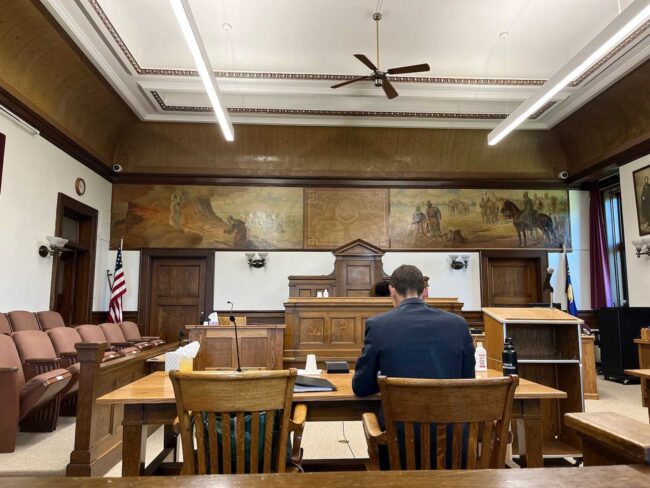![]() By Derf Johnson
By Derf Johnson
 The Legislature — aggrieved and offended by what it characterizes as judicial overreach and “activist judges” — has instigated and waged a war on the judiciary during the 2025 Legislative Session. Of course, anyone looking in from the outside can objectively surmise that the Legislature is an architect of its own problem – if it would stop passing obviously unconstitutional bills, it wouldn’t be losing in court so badly. This session, numerous bad judiciary “reform” bills have been introduced (over 25 in total), many the product of the interim’s specially created Senate Select Committee on Judicial Oversight and Reform. We’ve reached the halfway point in the session, and unfortunately many of these bad ideas are still alive and continuing to move through the process.
The Legislature — aggrieved and offended by what it characterizes as judicial overreach and “activist judges” — has instigated and waged a war on the judiciary during the 2025 Legislative Session. Of course, anyone looking in from the outside can objectively surmise that the Legislature is an architect of its own problem – if it would stop passing obviously unconstitutional bills, it wouldn’t be losing in court so badly. This session, numerous bad judiciary “reform” bills have been introduced (over 25 in total), many the product of the interim’s specially created Senate Select Committee on Judicial Oversight and Reform. We’ve reached the halfway point in the session, and unfortunately many of these bad ideas are still alive and continuing to move through the process.
By far, the most threatening legislation to an independent, impartial, and objective judiciary is legislation that would institute partisan elections into our judicial system. While two of these bills have failed to transmit are likely dead (HB 751 and HB 295), the remaining legislation – SB 42 (Sen. Daniel Emrich, R-Great Falls) – has passed the Senate and is now awaiting action in the House Judiciary Committee. This bill would require that candidates for the Montana district and Supreme Courts choose a party to be aligned with or run as an independent. This bill would inject an extreme amount of partisanship into our judicial system, which by its very nature should only apply the facts and the law, and not include partisan considerations. This bill is an extreme threat to the independent judiciary, the rule of law, and the ability for Montana citizens to pursue justice in our court system. The backers of the bill crow about transparency and argue that our judicial elections are already partisan, and this would just affirm that truth. But rather than introduce legislation that would distance our judiciary from partisan considerations, their solution would make it far, far worse.
A close second for problematic and highly partisan legislation is SB 385 (Sen. Tom McGillvray, R-Billings), which would create a “general claims court.” This bill is obviously designed for conservative members of the legislature to achieve desired partisan outcomes in the judiciary. The three judges would be appointed by the governor and confirmed by the Senate, rather than sitting for election as every other judge in Montana must do. The court would exclusively handle a specific set of issues, including constitutional challenges, any challenges against actions of state government, appeals of contested cases from administrative bodies of any agency of state government, and legal actions surrounding the Libby asbestos victims. This bill is a transparent attempt for certain members of the Legislature to achieve their political outcomes in the courts, regardless of potentially controlling jurisprudence, the law, and facts. The bill initially passed the Senate, but because it has a significant cost to the state, it has been re-referred to the Senate Finance and Claims Committee for consideration on its impact to the state budget.
A spate of other bills aimed at the judiciary are also still snaking their way through the process.
- SB 49 (Sen. Barry Usher, R-Billings) would exempt lawyers who also serve as elected officials (i.e. the Attorney General) from professional disciplinary measures and proceedings for actions taken while in office. This bill has already passed the Senate and is now awaiting action in House Judiciary.
- HB 39 (Rep. Tom Millett, R-Marion) would allow for political parties to contribute to judicial candidates and has already been signed into law by Gov. Greg Gianforte.
- SB 15 (Sen. Tom McGillvray, R-Billings) would allow for the impeachment of judges based upon subjective interpretations of their rulings. This bill has already passed the Senate and is now awaiting action in House Judiciary.
- SB 395 (Sen. Daniel Emrich, R-Great Falls) would tweak the “standing” requirements in order to file and maintain a lawsuit, presumably to discourage and prohibit individuals from pursuing claims in court. This bill has already passed the Senate and is now awaiting action in House Judiciary.
- SB 21 (Sen. Barry Usher, R-Billings) would allow for statewide elected officials to ignore a court order requiring them to perform one of their official duties. This bill has already passed the Senate and is now awaiting action in House Judiciary.
There are many more, but too many to list here. Of course, many of these will fail in the process as more and more legislators wake up to the fact that bills attacking the judiciary are wholly unnecessary, largely a waste of time, and likely unconstitutional. On that last point, many of these bills will undoubtedly cost the state precious time and money, as laws will inevitably be litigated for their unconstitutional infringement on the separation of powers doctrine (or additional constitutional issues).
MEIC is monitoring these bills closely, as the ability to go to court when an illegal permit is issued or an unconstitutional law is passed is central to MEIC’s advocacy to protect our right to a clean and healthful environment.
This article was published in the March 2025 issue of Down To Earth.

